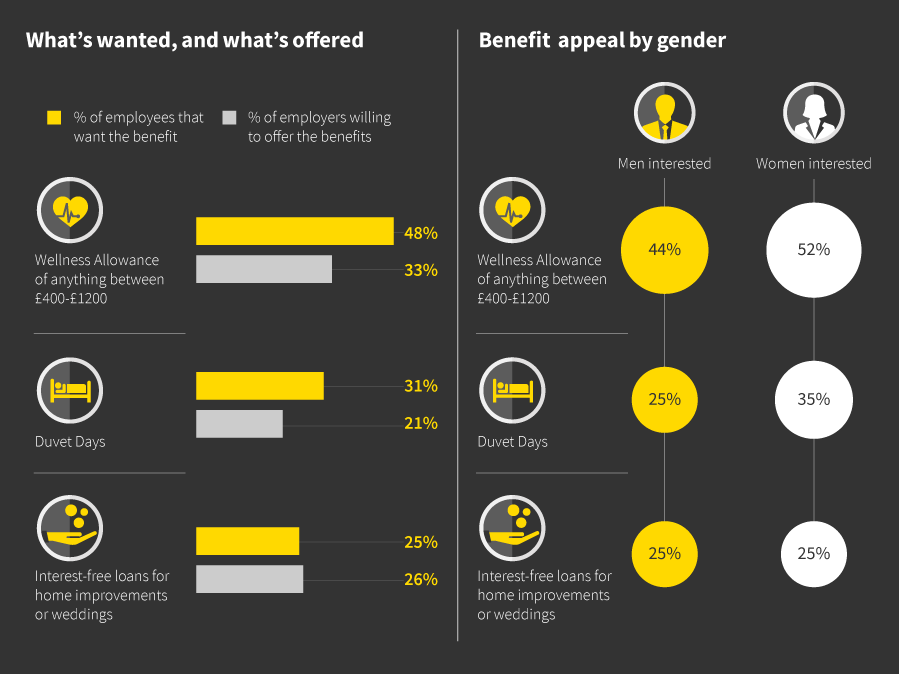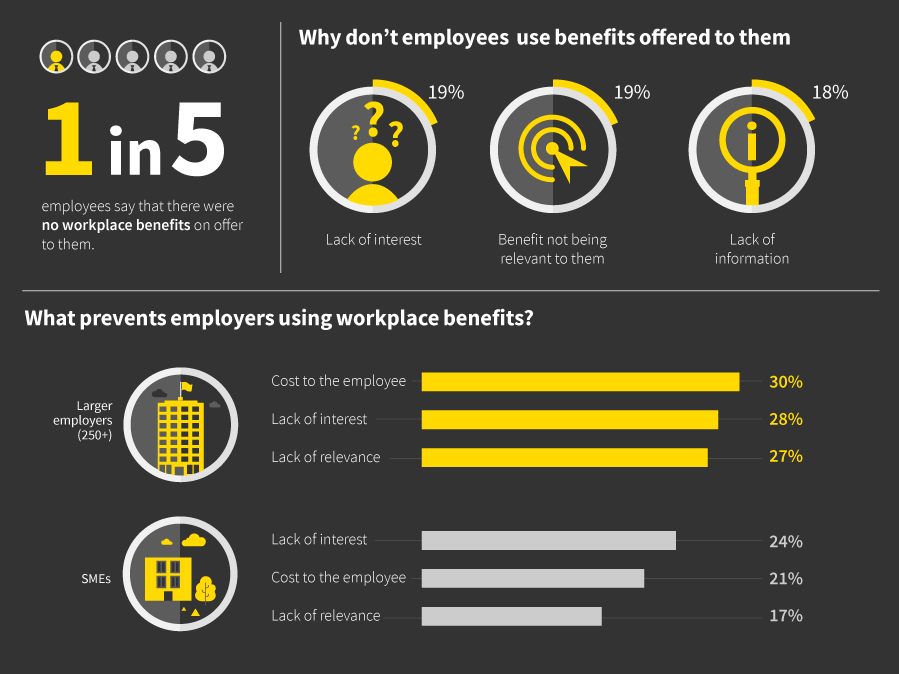To understand where the UK stands on workplace benefits, Aviva surveyed 2,000 employees and over 500 employers from varying business sizes to get their thoughts on what really matters to them
Increased connectivity is one way in which the workplace has changed. Employees’ ability to perform effectively may be enhanced, but along with this comes increased demands on staff. This comes at a time when an uncertain financial climate is already adding significant pressure to jobs.
Job security, a competitive salary, and generous annual leave will always be key considerations for anyone job hunting. But as demands on staff increase, so do their personal needs. This means that employers need to consider expanding benefits aligned to the ‘always-on’ working culture. In this environment, it’s in everyone’s interests to enhance the personal resilience of the workforce.
For some workers, flexi-time and remote working are a given. For others, they would simply appreciate the opportunity to enjoy a guilt-free day off to stay in bed. Is it too much to ask? For some companies, it may be, but for others change is afoot.
Why employees choose their place of work
Unsurprisingly, our research showed that salary is one of the core reasons why employees choose their employer, with 41% of those surveyed citing it as a priority. But it shares a spot with work-life balance, also cited by 41% as a key reason why they joined their present employer.
When our survey questioned why people stay with their employers, 44% of employees stated that work-life balance was one of the main reasons why they continued in their current role.
There was some interesting variation between large and small businesses. Among those working at organisations with 250+ employees, nearly one in two said they did so for financial reasons, whereas just one in three workers from micro businesses (businesses with 0-9 employees) felt that money was a deciding factor.

Which benefits matter the most?
Different benefits work for different workplaces, from work socials to dogs in the office, all have their advocates. Nevertheless, our research revealed that more traditional benefits remain popular. Annual leave still matters the most, with 44% of those surveyed identifying it as one of the workplace benefits of greatest interest to them. The top three was completed by a company pension (41%) and flexible work (39%).
It seems that companies trying to enhance performance through free meals are falling behind, with only 16% declaring an interest in this benefit – though these benefits found greater favour in the capital, with Londoners also placing increased value on subsidised travel.

Animal lovers may be saddened to learn that ‘dogs in the office’ was cited as one of the workplace benefits that people care less about when asked. This was closely followed by entertainment at work and then subsidised child-care and on-site creche. Along with this, one in four people had no interest in being sociable with workplace social events being something people would be happy to go without.
What new benefits are in demand?
In the current fast-paced work environment, we know that jobs can be demanding with many workers always being contactable. Accordingly, people expect their employers to look after their mental health. It’s no surprise that a wellness allowance was by far the most popular requested benefit, allowing staff to have access to money to help support staying mentally fit and well at work. Typically, funds range from £400 to £1,200 annually and are to be spent on things such as gym memberships and mindfulness courses. But only one-third of employers would be willing to provide this benefit to their workers.

Second on the list of untypical benefits that employees want to see implemented is the duvet day, whereby staff would be allowed days off to simply stay in bed. Women are much keener on duvet days than men however, with over one-third of women wanting the scheme, compared to just a quarter of men. But only one in five business leaders would be willing to grant this benefit to their staff.
Why don’t people take full advantage of the benefits on offer?
As many as one in five UK employees say that they don’t take advantage of workplace benefits because there aren’t any available to them. This suggests a significant proportion of people are receiving no additional benefit to their working lives, other than the pay cheque and annual leave they receive. Their employers may, of course, feel otherwise.

For those workers who do have access to workplace benefits, there appears to be a number of reasons why they don’t take advantage of them. Chief of these is a lack of interest, closely followed by the feeling that a particular benefit is irrelevant to their needs. Some also felt that there was a lack of information as to what benefits are available to them. It’s clear from this that there is often a disconnect between staff members and business leaders.
Do companies struggle to offer benefits?
A perceived lack of workplace benefits is only half the story. The results of our survey illustrated that business leaders can find it difficult to put in place benefits that their staff will appreciate and use.
Although cost was given as the biggest reason for not doing so, some larger companies with big workforces felt that the time required to implement benefits was a significant barrier. And for SMEs, one of the biggest problems encountered was shown to be the lack of resources to implement and manage an employee benefits scheme.

There was, however, a recognition amongst business leaders that there is room to do more to improve staff satisfaction. Of the employers we surveyed, 25% felt that cost to staff is preventing their employees from taking advantage of the benefits on offer.
Resilient businesses need healthy, happy and financially secure staff
It seems that people truly understand what they want and need, but their employers don’t necessarily have the capacity to give it to them. In a fast-paced and highly connected working world, both individuals and the businesses they work for can feel pressured by uncertainty. The ability to deal with this uncertainty is fundamental to building a successful and resilient business with healthy, happy and financially secure staff.
Happy employees are more productive and allow businesses to be stronger in tough financial times.
Survey details
Survey results are based on responses from 502 employers varying in sizes based on the number of employees. The splits include businesses with 1-9 employees, businesses with 10-49 employees, 50-99 employees, 100-249 employees, 250-500 employees, and 500+ employees.
2011 employees, were asked to choose up to three reasons that attracted them to their current role and three reasons why they now stay in it from a list of 11. They were also asked to choose up to five workplace benefits they are most interested in and five they are at least interest in from a list of 19.
Employers were asked to pick all of the reasons they thought prevented an update in employee benefits from a list of 8.
Original source: https://www.aviva.co.uk/business/business-perspectives/featured-articles-hub/employee-benefits-survey/











